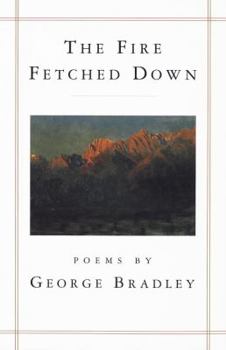The Fire Fetched Down
As up-to-date as the current cosmography, as steeped in tradition as ancient agriculture, George Bradley's The Fire Fetched Down overflows with energy, humor, and intellectual curiosity. Readers will... This description may be from another edition of this product.
Format:Paperback
Language:English
ISBN:0679766022
ISBN13:9780679766025
Release Date:January 1998
Publisher:Knopf Publishing Group
Length:80 Pages
Weight:0.37 lbs.
Dimensions:0.3" x 6.2" x 9.3"
Related Subjects
PoetryCustomer Reviews
2 ratings
Full Bodied Sip of George Bradley
Published by Thriftbooks.com User , 21 years ago
The Fire Fetched Down, George Bradley's 1996 poetry volume, is a tour de force. But let me warn the uninitiated, Bradley, like Yusef Komunyakaa, is a consummate wordsmith. Plan to read with a huge unabridged dictionary nearby. Bradley's poems were well worth that exercise!! He delights in using the exact technical term or to flesh out the simplest of scenes, the most common of actions. My favorite poem is Bradley's "A Georgic for Douglas Crase," ostensibly about the fine art of wine-making--from the planting to the harvesting to the tasting and bottling. However, the care with which the speaker instructs the grower is a metaphor for the writer's ars poetica. Since poetry can be defined as compressed language, Bradley's word choice is as exact as humanly possible. Like the variables which beset the wine-maker, this poet wends his way through the labyrinth of human discourse--the oral and written--to produce highly individualized poems, rare vintage all.
Fetching as Starlight
Published by Thriftbooks.com User , 24 years ago
After the first reading I really couldn't think of anything to say about this collection. I liked it well enough, but nothing struck me as memorable-one phrase only, and it's right out of the gate in "Frug Macabre": "Or is it that thought and action/are irreconcilable enemies/(as Emerson says somewhere,/and he's got lots of somewhere,/you'll have to find it yourself)". This was resonant of my own experience with Emerson, try looking into more than his essays, which are "lots of somewhere" in themselves. But as you read further you imagine that Bradley knows exactly where to locate this in Emerson. And, indeed, "Frug Macabre" also has lots of somewhere, and perhaps contains nearly every theme and idea that will be addressed in the poems to come. What becomes clear is that this is a poet of considerable craft and erudition (it is apparent from previous volumes through this latest that he is especially well-versed in physics). These are poems that must be revisited in order to begin to understand all that is present within them. They will float by, quietly as "distance drifts above a tranquil sea", but lay hands on only one of them and you will begin to open the other worlds present in poetry.This volume has a prefatory poem with the rest of the 21 poems divided into four sections. Sections I and IV consist of one long poem each. Sections II and III contain mostly lyrics in various forms, from ode to sonnet to villanelle. It is an impressive, formal array. Bradley ends with a Georgic (for Doug Crase, a poet, author of "The Revisionist"), a didactic poem intended to instruct or teach a skill in an art or science (see Hesiod)-in this case wine-making-while imparting life-lessons along the way, or at least bits and pieces of aphoristic wisdom. This "instruction" is really what most of these poems attempt. They teach us to see through our received perceptions, most pointedly our perceptions of morality. But let's begin at the beginning-here we discover what we should be prepared for as readers. The prefatory poem, "6 X 10 X infinity" ("infinity" is printed as the sign for infinity, the sideways 8), begins with the image of the hand of the poet (and reader-for we must perform the same acts of interpretation) removing a book from the shelf and entering into the world of the book, which is more than one other world, but many. This is surely intended to mean this book and what follows. The language used also prepares us: the book is a "levelled block of reason", the poem "a small aperture", this life "worn and circumscribed", the "general life" found in the book is an "immense atmosphere." And what is central: "Here is no response, simple of the soul, physic/Compound of metaphysics, broken wafer to make us whole." We will not get answers-these poems will not absolve us, will not lead us to unity and bring our science in line with our religion. Poems must cast light on the interior ("candles dancing o






